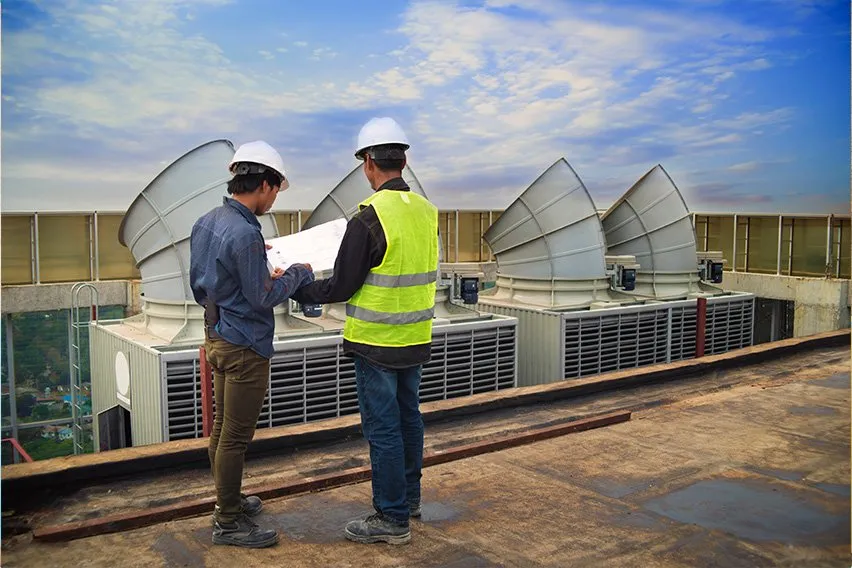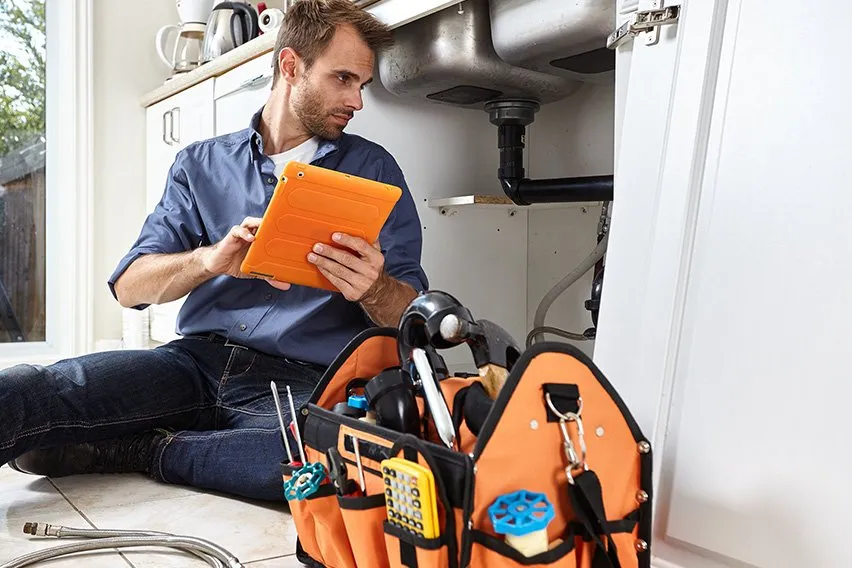How to Start an HVAC Business—9 Step Guide

If you’ve ever stepped into an air-conditioned building on a hot day or turned up the heating system mid-winter, you know how important HVAC businesses are. It’s easy to take for granted, but HVAC affects our everyday lives. As a future business owner, you may wish to capitalize on this by learning how to start an HVAC business.
With a service-based business, you need to have both technical and administrative knowledge. While this can feel daunting, there are many simple ways to get started.
In this guide, we’ll showcase nine practical steps you can embark upon today in order to set up a successful HVAC company from the start.
Here’s What We’ll Cover:
9 Steps to Starting an HVAC Company
Common Mistakes HVAC Startups Make
The Bottom Line—Starting Your HVAC Business
Businesses Related to HVAC Service
What Do HVAC Businesses Do?
An HVAC company offers specialized services for heating, ventilation, and air conditioning units either in residential or commercial properties. Professional HVAC technicians are trained to offer a variety of services including repairs, maintenance, replacement, and installation. HVAC businesses also serve as subcontractors in building and construction projects.
HVAC businesses often step in and help customers when they’re in a pinch. This type of work can include emergency repairs and on-site visits when HVAC units fail or need maintenance. As a result, many HVAC companies offer both normal business hours and on-call services.

Types of HVAC Businesses
Technical knowledge of HVAC operations is usually similar, no matter which type of field you start work in. There are, however, a few different specialties that you can choose to offer as an HVAC business owner.
The three most common types of HVAC businesses are:
- Residential: HVAC companies that specialize in residential services are most likely to work with homeowners in single-family homes, or in complexes like apartments and townhomes. Specific services vary, but most units are small and compact.
- Commercial: This type of HVAC service is suitable for larger buildings and commercial properties. Units are larger, even industrial in size, and ventilation is a key component.
- HVAC contracting: As an HVAC contractor, you may focus more on installation and implementation. Builders and construction firms might hire HVAC contractors or specialists to develop the heating and cooling plans for new properties and to install these systems according to code.
9 Steps to Starting an HVAC Company
If you’re interested in starting an HVAC business, you likely have some experience in the field already. Whether you’ve been working in the HVAC industry for some time, or you’re new to the HVAC industry and dreaming ahead, it’s always helpful to set goals. The nine steps below provide a blueprint to follow if starting an HVAC business is on your list.
1. Develop Your Business Plan
If you want to start an HVAC business that’s made to last, start with a strong foundation. Developing a business plan is one of the simplest ways to do that. This document or outline establishes the vision for your business in the HVAC industry over several months and years.
When writing your first HVAC business plan, you should make sure to include key points such as:
- The elevator pitch that summarizes what your company does
- The legal structure of your business
- A summary of management and employment
- Projected debts, liabilities, and revenue
- Research about your competitors and target market
2. File Business Paperwork
With your business plan in hand, you can move forward to making things official. Small business requirements vary by state of residence. Check with your local clerk’s office or county government to determine the requirements for a HVAC technician business permit.
If you maintain a physical office or business location, you may also be required to obtain a zoning permit. Keep in mind that many of these licenses will require small administrative fees.
During this process, you should also submit your business information to the IRS to obtain an employer identification number (EIN). This step legitimizes your company and simplifies the process for your finances and taxes.
3. Calculate the Break-even Point
In business, a break-even point (BEP) is the moment at which your sales exceed your expenses. At this time, you’re no longer trying to float your business costs because your incoming cash revenue is high enough to cover them.
To calculate the BEP when you start your new HVAC business, you will need to identify:
- Your fixed costs, including all associated expenses and overhead
- The price of your standard or average service
- The variable cost per job, which mostly includes materials and labor
Once you have these numbers, subtract your variable costs from the price of your standard service. Then, divide your total fixed costs by the number you just calculated. The end result is how many jobs or services you would need to complete or sell in order to break even.
4. Set up Banking and Accounting Structures
Financially, it’s always a good practice to separate your personal and business finances. With your EIN in hand, you can easily set up unique checking and savings accounts through the bank of your choice. This provides transparency and protects your personal assets.
Additionally, it’s wise to plan for consistent, organized accounting and bookkeeping. Whether you hire an outside expert or maintain these processes internally, the point is that you don’t wait to keep organized financial records.
An accounting platform for HVAC businesses can also make this process smoother. With a powerful mobile platform, you can accomplish crucial business tasks like invoicing, overhead expense tracking, payroll processing, and more.
5. Get Small Business Insurance Coverage
Having comprehensive insurance coverage provides a safety net for a variety of things in your business. Not only does it cover you as an individual, but it also provides security for your vehicles, equipment, employees, and business assets.
Insurance policies can prove to be a bit complicated, especially if you’re not accustomed to comparing them for business purposes. Make sure to seek out licensed insurance brokers in your area who are familiar with the requirements for HVAC services.
As your business grows and changes, you may need to expand or change your insurance plan. This is a fairly standard process in business, particularly for service providers who work directly with customers in their homes or commercial properties.
6. Develop a Plan for Covering Startup Costs
Although you can choose to bootstrap your business with personal cash assets at the start, many business owners either don’t have access to the total amount or don’t want to deplete personal savings. No matter what you decide, outline your plan for financing startup costs in the HVAC industry.
In an HVAC company, your startup costs might include:
- Vehicles
- Tools and equipment
- Safety materials
- Uniforms
- Standard office supplies
- HVAC licensing
- Professional signage
- Services like a phone line or Wi-Fi
A small business loan is only one of many options for financing your business. Business credit cards, lines of credit from local banks, and cash from investors could all prove to be viable options for securing what you need.
7. Identify Your Unique Value Proposition
A value proposition is an idea or statement that clearly communicates what you offer to customers. This usually includes something that goes beyond the standard or baseline level of service that most people expect to get.
As you develop your value proposition over time, think critically about what a customer can expect when choosing your company over other options. Will you offer special incentives or package deals? Do your employees have unique certifications or HVAC licenses?
Your value proposition also informs decisions related to marketing, advertising, social media, and lead generation. The more specific you are, the more prepared you will be to sell your services on social media and elsewhere.
8. Set Your Rates and Pricing Structure
One of the decisions you must make before you open for business is how much to charge for things like service calls, diagnostic fees, installation, and maintenance. To accurately set your rates, take the time to research local competitors to get standard pricing for basic services.
Deciding how to price your services has greater impacts than what you might realize. Although the amounts you choose influence how much you’ll make personally, pricing can influence which customers you attract, how you pay for overhead costs, and how long it takes your company to become profitable.
If you’re struggling to know what’s reasonable, seek out a trusted business advisor or personal mentor to guide you through this process.
9. Pursue Continued Training Opportunities
An HVAC certification is the baseline for the training and education you need to operate an HVAC business. You’ll also need to keep up with your state-issued HVAC license in order to stay compliant.
In addition to the basics, you must also pass and maintain various exams per HVAC specialty. This can include having professional licenses for operating small appliances, air conditioning units, high and low-pressure systems, commercial refrigeration, and more.
As you establish and grow your HVAC business, dedicate time to keeping up with your industry. Moreover, as you hire a team of employees, verify their qualifications as well. Having a highly trained team can provide huge benefits to your business and customers.

Why Start an HVAC Business?
One of the many questions that future business owners often ask is, “Will this business venture be a good idea?” Although each business decision should be a personal one, there are several reasons why starting an HVAC business could be beneficial both personally and professionally.
- HVAC services are essential: Between the residential and commercial opportunities, the need for qualified HVAC providers is significant. Not only that, but HVAC isn’t just important for installation. Regular maintenance and replacement is required to keep these systems running smoothly for years to come.
- There is high profit potential: Recent HVAC workplace surveys show that there is a high upper range for profitability as an HVAC business owner. While there are many factors that influence this, including the size of your company and number of employees, there is potential for growth in the HVAC industry.
- You can influence many different parts of the business: As the owner of your HVAC company, you can play a key role in its trajectory. From setting the business culture and providing opportunities for employees to serving the local community, the possibilities are endless.
Common Mistakes HVAC Startups Make
As you’ve learned, the potential for success in your HVAC business is great. That’s not to say, however, that you won’t encounter challenges along the way. How you overcome hurdles can strengthen your resolve as a business owner and leader.
Below are some of the most common mistakes that HVAC business owners make.
- Not having the proper insurance: When you’re responsible for the installation of any piece of equipment in a home or property, you must understand liability. There are always safety risks associated with these services, but there are also ways to reduce them. Failing to secure insurance coverage and the proper licensing can set you up for disastrous consequences in the event of accidents or mistakes.
- Waiting to establish an accounting system: Occasionally, business owners assume that they only need accounting once they start making a certain amount of income. The truth is, however, that you need a system in place right away. Powerful accounting software for small businesses can help you handle your finances from day one. Starting an HVAC business is made easier when you have a solid accounting system from the very beginning.
- Not keeping a good check on independent business activities: As a business owner, your level of involvement in daily operations may vary over time. You may eventually hire an HVAC technician and other employees to handle much of the leg work. No matter how hands-off you are, however, you should always keep a pulse on the amount and quality of work that the individuals you hire are performing.
The Bottom Line—Starting Your HVAC Business
Remember, sometimes the only way to get started is to do the hard work. Yes, you will need to invest time and energy into solving difficult challenges, but that is the nature of business. The more comfortable you are with taking ownership of both wins and losses, the more you’ll be able to grow and adapt as your business grows.
By following the above HVAC business plan, you’ll already have an advantage. Although many steps are basic in nature, following them can help you reap the benefits of a business that’s built to last. Get started on your HVAC business today to turn over a new leaf in your career.
Businesses Related to HVAC Service
- How to Start a Painting Business
- How to Start a Moving Business
- How to Start a General Contractor Business
- How to Start a Pest Control Business
- How to Start a Plumbing Business
- How to Start a Roofing Business
RELATED ARTICLES

 How to Become a General Contractor—7 Step Guide
How to Become a General Contractor—7 Step Guide How to Become a Professional Handyman 8 Easy Steps
How to Become a Professional Handyman 8 Easy Steps How to Start a Moving Business in 10 Steps
How to Start a Moving Business in 10 Steps How to Start a Successful Painting Business
How to Start a Successful Painting Business How to Create an Online Portfolio for Photography Studio
How to Create an Online Portfolio for Photography Studio How to Start a Makeup Business in 10 Steps
How to Start a Makeup Business in 10 Steps